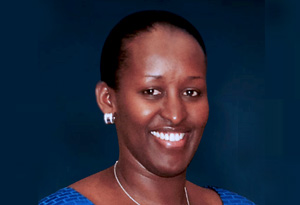The New Women of Rwanda

Photo courtesy of PSI.org
The first lady of Rwanda explains how her country is defining itself post-genocide and the role Rwandan women are playing in the healing of society and the building of a nation.
Madame Jeannette Kagame became the first lady of Rwanda when her husband, Paul Kagame, took office as president in 2000. Kagame spends much of her time in philanthropic work, particularly with widows and orphans of the Rwanda genocide and the HIV/AIDS epidemic. She was a founding member of the Organization of African First Ladies against HIV/AIDS in 2002. OAFLA was created by African First Ladies to advocate for increased awareness and mobilize resources for HIV/AIDS on the continent. She is also president of the Imbuto Foundation, which supports the development of a healthy, educated and prosperous Rwanda. Kagame shares her thoughts with Celina Schocken, the director of international organizations of PSI.org, a leading global health organization. Celina Schocken: You have done significant work promoting greater emphasis on women and girls in development. Is the battle for their health and education in Rwanda, and in Africa, being won or lost?
Jeannette Kagame: I believe things are getting better, although we still have a long way to go. We also have to keep fighting for girls and women without forgetting that in many of our countries, especially in Rwanda where we had to start from zero, boys also need to be supported and men need to be mobilized to be part of the struggle for healthier, better-educated families. At the Imbuto Foundation, we have 1,000 disadvantaged boys and girls on scholarship, and with the understanding that girls face specific barriers to performance, each year we reward the best performing girls in every district to motivate them toward academic excellence. This is our way of contributing to government efforts. In an environment where there is so much need, every effort counts. It is particularly important that Rwandans be involved in solutions to our healthcare challenges as a nation. With committed governments, involved communities and effective coordination of global and regional partnerships, I have no doubt that Rwanda and Africa will win the battle for healthy, educated and skilled citizens.
CS: Rwanda has an unusually high proportion of women in the general population because so many men died during the genocide. How does that affect the country? Can it help to explain the exceptionally prominent role of women in leadership positions?
JK: Rwandan women make up 52 percent of the population. In the immediate aftermath of the genocide, indeed many men had died or were in prison for genocide crimes; this left women in charge of homes and communities. However, it is incorrect to attribute this factor to the prominent role of women today. Historically, Rwandan women were treated with respect and considered a quiet force. The prominent role of women in Rwanda today is due to conscious decisions made by the post-genocide leadership, which understood the importance of women and supported women's active participation in all aspects of the nation's development. President Kagame sums it up with this quote: "How can a society hope to transform if it shoots itself in the foot by squandering more than half of its capital investment?"



